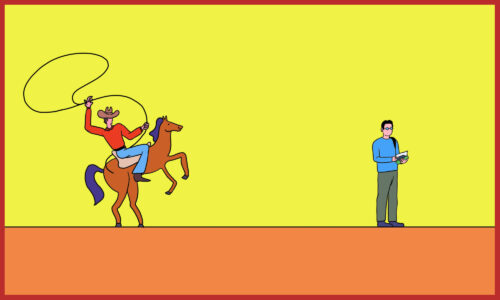Chinese Corner: Baidu’s bad year, doping for gaokao, and the perfect sex doll
Chinese Corner: Baidu’s bad year, doping for gaokao, and the perfect sex doll

Chinese Corner is Jiayun Feng’s weekly review of interesting nonfiction on the Chinese internet.
Baidu’s very bad year
首次亏损,百度是怎么把一手好牌打烂的?
First loss for Baidu. How did it waste all of its good cards?
By 三联生活周刊
May 20, 2019
Almost 15 years after it went public, search engine giant Baidu, China’s equivalent of Google, reported its first-ever quarterly loss in May. According to the company, the sharp drop in its earnings in the first quarter of 2019 — a significant net loss of 327 million yuan ($47 million) — was mainly due to its heavy investment in cutting-edge technologies like artificial intelligence and a slump in its main online advertising business. The disappointing report had a chilling effect on the company’s stock price, which fell 33.8 percent last month and hasn’t seen an effective recovery yet.
The loss, however, wasn’t a total surprise to those who’d followed Baidu in the past few years. Ranging from various unethical business practices, including its failure to curb the spread of misleading information on its platform, to its aggressively antagonistic pose toward online criticism, even including those from average internet users, Baidu’s long list of scandals and missteps constantly tested the faith of investors, the public, and even its own employees.
To help you keep up, here is a list of Chinese articles that tell you everything Baidu has been through in this particularly tough year:
- 百度最难捱的一夜:五名高管闪电辞职内幕 The most difficult night for Baidu: Inside the sudden resignation of five senior managers
- 向海龙的往事 The past of Xiang Hailong
- 离开百度,他们都去哪儿了? Where did they go after leaving Baidu?
- 李彦宏有资格当院士吗? Is Robin Li qualified to be an academician?
- 院士评选暴露出的最大问题其实是…… The biggest problem revealed in this year’s academician nomination is…
- 李彦宏挥刀向海龙 Robin Li wields his axe upon Xiang Hailong
- 百度掉队BAT Baidu is left behind in BAT
- 百度: 总有刁民要害朕 Baidu: Someone is trying to set me up
- 这届百度公关可能“不太行” Baidu’s current PR team is probably “losing it”
- 倒霉的复旦,谄媚的百渡,自恋的李彦浤 Unfortunate Fudan, sycophantic Baidu, and self-absorbed Robin Li
- 百度命系AI AI is Baidu’s lifeline


Doping for gaokao
高三那年,父亲给我买了“聪明药”
In my final year at high school, my dad brought me “smart drugs”
By Luó Qiān 罗芊
June 2, 2019
Studying is hard, especially for Chinese students. In order to gain an edge in the gaokao, the national college admission exam, more and more high schoolers are turning to ADHD medication, such as Adderall and Ritalin. The problem is emblematic of the country’s cutthroat academic environment.
Also known as “smart drugs,” these stimulants are often given by the students’ parents, who are unaware of or totally overlook the pills’ addictive qualities and the potential mental damage they may cause. What makes things worse is that since these performance-boosting drugs are prescription medications, parents of non-ADHD children often purchase drugs from the black market, where these “smart pills” are sometimes replaced by other hard drugs.
Currently going through drug withdrawal in a local rehab facility, Lú Qínqín 卢琴琴, a high school dropout, started with Ritalin and ended up taking crystal meth. In this essay, she painfully describes how she took her first “smart pill” given by her father, how she quickly became reliant on it, and how her addiction took a huge toll on her family relationships.
“Having good grades is an addictive feeling,” she writes. “After taking two pills, I would think if three pills would further increase my productivity. Sometimes I took five pills a day, and I could barely sleep. I woke up in the middle of the night tidying my room. I mopped the floor until I ran out of steam.
“I couldn’t risk taking a withdrawal from the drug. One time, I didn’t ace an exam because I forgot to take pills. The failure made me extremely upset. The only thought I had at that time is that I’m nothing without the drug.”
Additional reading:
- 千禧一代的高考冒险:那些偷偷吃「聪明药」的学生 The gaokao adventure for millenials: The students who take “smart pills” secretly
- 高考在那儿,衡水二中就是性价比的问题 When gaokao is here, Hengshui No. 2 High School is all about cost-effectiveness
- 衡水中学没有秘密 There is no secret at Hengshui High School


What a sex doll tells us about Chinese men
Poor sex doll No. 85
By Yáo Yìnmǐ 姚胤米
May 27, 2019
The best-selling lifelike female sex doll in China doesn’t have an actual name. Identified as “No. 85” by its sellers, this silicone doll was carefully designed to dominate the sexual device market, with elements scientifically tested to appeal to straight Chinese men. Her face is a meticulous combination of different features taken from real-life celebrities. Her body is mildly curvy, which, according to its creators, is what Chinese men find most attractive. Even her makeup, which looks effortlessly natural but subtly seductive, is a result of extensive research on male buyers’ preferences.
As author Yao Yinmi argues, the doll, as a whole, is an outlet where Chiense men can “unleash their unrealistic expectations of women,” which are largely defined by flawless beauty and absolute obedience.


The elderly suicide crisis in rural China
农村老人自杀现象:在家庭中找不到存在的位置
The suicide problem among China’s rural elderly: They can’t find their place among families
By Lǐ Ruò 李若
June 3, 2019
Previous studies have shown that the elderly suicide rate in China is four to five times higher than the rest of the world. Suffering from a host of hardships, such as mental-health problems caused by long-term solitude and a major lack of medical resources, a growing number of seniors in the Chinese countryside have opted to take their own lives to avoid being burdens on their children, who have moved to faraway cities in pursuit of economic opportunities.
In this essay, a former migrant worker from Henan Province offers a chilling account of three elderly suicides that he witnessed in the span of a year after he moved back to his hometown in rural China.
After Ms. Du committed suicide, I saw some seniors chatting about her. They recalled that before Du’s death, she said on multiple occasions that she didn’t want to live too long, which would make both her children and herself suffer. No one took her words seriously at the time. They told her that her offspring were dutiful and she had many days ahead. These seniors quickly moved on to talk about another paralyzed elder who was starved to death after her children stopped visiting her.
Additional reading:
How China’s rural elderly are being left behind and taking their lives / The Globe and Mail
Things that I read and loved this week:
- 「头顶桂冠,身披枷锁」:获诺贝尔奖七年后的莫言 Crowned and constrained: Mo Yan, seven years after winning the Nobel Prize
- 开房车环球旅行的中国老人们 The Chinese elderly who travel the world in an RV
- 「长江学者」们的江湖地图 Map of Changjiang scholars
- 中国有一个地方叫404 China has a place called 404
A personal account of growing up in China’s 404 City, an abandoned nuclear site which for a long time was detached from the rest of the country.
- 中药注射剂前世今生 The history of traditional Chinese medicine injections
- 中国人为什么爱吃猪肉 Why Chinese people love eating pork







